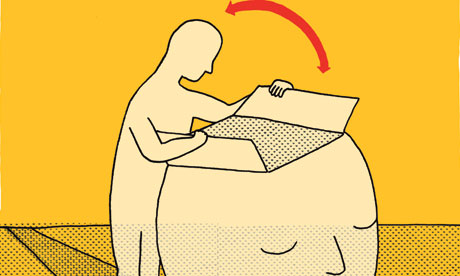
Rates of depression and anxiety are rising in the modern world. Andrew Oswald, a professor at Warwick University who studies wellbeing, recently told me that mental health indicators nearly always point down. "Things are not going completely well in western society," he said. Proposed remedies are numerous. And one that is garnering growing attention is meditation, and mindfulness meditation in particular.
The aim is simple: to pay attention – be "mindful". Typically, a teacher will ask you to sit upright, in an alert position. Then, they will encourage you to focus on something straightforward, like the in- and out-flow of breath. The aim is to nurture a curiosity about these sensations – not to explain them, but to know them. There are other techniques as well. Walking meditation is one, when you pay attention to the soles of your feet. That too carries a symbolic resonance: if breath is to do with life, feet are a focus for being grounded in reality.
It's a way of concentrating on the here and now, thereby becoming more aware of how the here and now is affecting you. It doesn't aim directly at the dispersal of stresses and strains. In fact, it is very hard to develop the concentration necessary to follow your breath, even for a few seconds. What you see is your mind racing from this memory to that moment. But that's the trick: to observe, and to learn to change the way you relate to the inner maelstrom. Therein lies the route to better mental health.
Mindfulness, then, is not about ecstatic states, as if the marks of success are oceanic experiences or yogic flying. It's mostly pretty humdrum. Moreover, it is not a fast track to blissful happiness. It can, in fact, be quite unsettling, as works with painful experiences, to understand them better and thereby get to the root of problems.
Research into the benefits of mindfulness seems to support its claims. People prone to depression, say, are less likely to have depressive episodes if they practice meditation. Stress goes down. But it's more like going on a journey than taking a pill. Though meditation techniques can be learned quickly, it's no instant remedy and requires discipline. That said, many who attend lessons or go on retreats find immediate benefits – which is not so surprising, given that in a world of no stillness, even a little calm goes a long way.
Part of the appeal of mindfulness is that it doesn't come loaded with theological assumptions. You can do it without being a Buddhist, though Buddhist assumptions do underpin it. The most obvious is the concept of dukkha – which can be translated as suffering, dissatisfaction or discontent. It's meant in a very broad sense, everything from deep psychological wounding to the faintest perturbations that trouble daily life. The Buddha's discovery, when he was enlightened, was that life is characterised by such suffering. But there is a path to follow, along which suffering will cease. Meditation is a key part of it. Mindfulness eases the habit of clinging to things, even big things like life itself. When the clinging ceases, the suffering ceases too.
Other traditions take a subtly different view. Christianity, for example, teaches that the fundamental characteristic of life is not suffering, but the quest for love. It's what Saint Augustine had in mind when he diagnosed that to be human is to have a "restless heart". He argued that the restlessness propels you to discover the source of life, which lies outside of yourself, in God.
A secular take on suffering might see things differently again – as a kind of alert system, telling you that something is wrong with the world. The way to respond is not to detach yourself, but to address the causes. It's this notion of easing suffering that inspires everyone from doctors to political reformers.
Buddhism has strands that engage in social action too. As for seeking God, there are many non-Buddhist theists who practice mindfulness as a useful technique. This supports the case that you don't have to be a Buddhist to engage in mindfulness, particularly when it is offered as a practice aimed at caring for yourself. Then, it's about knowing yourself better, something recognised as a crucial part of living well across a wide range of traditions. It's striking that today we often don't take the time to do so. Hence, perhaps, many of the ills of the western world.
But mindfulness says: make the time to step back, and here's a way to do it. It encourages you to be more aware of life, and promises that mindfulness is a source of insight and hope.
Mark Vernon is the author of The Good Life (Hodder); markvernon.com

